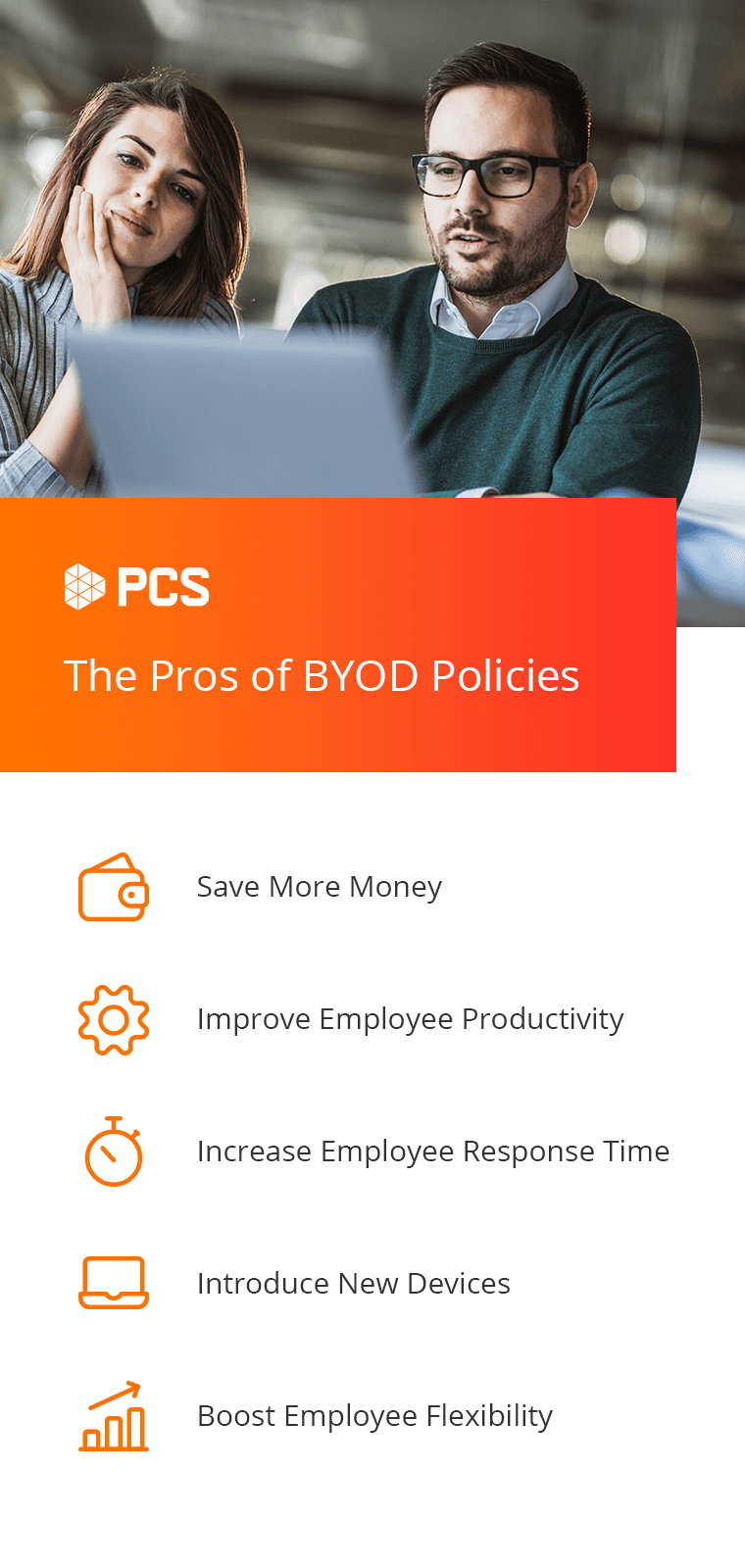Every day, we see the implementation of new policies that can enhance the working process, benefiting both employees and employers. For example, a phenomenon in recent years has been remote work. In that same vein, some companies have started allowing workers to bring their own computers, smartphones, and other electronic equipment to work, otherwise known as BYOD.
BYOD has many advantages including reduced company costs and better employee satisfaction. Under this policy, employees are allowed to bring their devices to work, and in return, they get bonuses and compensation as a reward. BYOD guidelines particularly benefit small businesses by reducing their workstation fees. However, you should note that BYOD still has downsides.
A major concern with BYOD regulations is security. Those who bring their own devices to the workplace can become victims of data breaches, creating significant issues for your business. Therefore, you should weigh BYOD pros and cons before you decide to take this route. Here’s a look at everything you should know about BYOD.

What Is BYOD?
BYOD has become a popular policy in many workplaces. This policy allows the employees to bring their devices like laptops, tablets, and smartphones to work. They use these devices in addition to the ones their employer may have provided.
BYOD policies are increasingly widespread, and several companies worldwide are adopting them to save money. Businesses that implement BYOD can potentially save $350 a year per employee which adds up quickly when you have a large staff. It can also help small businesses in the start-up stages because they don’t have to worry about supplying electronics.
These days, most people have access to personal devices — and they can become attached to the particular operating systems and interfaces on those devices. After all, you’re likely either a loyal Apple user or you prefer PCs. These circumstances have made BYOD a smart option for companies, as they don’t have to make employees choose. Sometimes, businesses will even compensate those who use their own devices since the policy makes so much sense.
BYOD is often called the consumerization of IT, as employees use their personal devices for work-related tasks. Whether or not the company supports the devices, the personal devices connect to the company’s network. BYOD guidelines serve as a framework that control the use of these devices and help reduce the risk of security issues.
Allowing employees to use their personal devices can boost productivity and positively impact performance but doing so comes with several potential threats. Since the companies don’t provide the devices, they can be a security threat. The risk of a data breach can increase, and troubleshooting also becomes a problem with BYOD implementation.

The Pros of BYOD Policies
Allowing employees to use their personal devices in the office can be beneficial for both parties. After all, there’s a reason why about 75% of companies have some type of BYOD policy. Let’s look at some of the biggest pros you’ll see after embracing BYOD in your enterprise.
1. Save More Money
The biggest benefit BYOD brings is savings. When companies no longer have to buy phones and laptops for all employees, they can save a decent amount of money. The latest phone models can cost anywhere from $400 to $800, and when companies allow the employees to use their own devices, they don’t have to spend that money themselves.
In addition to the costs of the models, companies will also save on phone plans. Since the employees will be using their own devices, they’ll be responsible for renewing their phone plans. Adopting BYOD can eliminate all these expenses, and you can divert the saved income to other sections of your company.
2. Improve Employee Productivity
Employees have personal preferences when it comes to devices. Some prefer an iOS operating system while others want their devices to run on Android. When they use their own device, they’ll be more comfortable with the operating system, which will enhance their productivity.
If a job requires using a work phone, you may find that your employees work more productively when their work phone is the same as their personal phone. This way, they don’t have to learn a new system since they already know how everything operates. Additionally, employees won’t have to keep track of another device.
3. Increase Employee Response Time
This point is a more subtle benefit of BYOD. By allowing employees to use their personal phones in the office, the company gives them more freedom. That assures the employees they’re trusted which can reflect positively on their performance.
Since employees carry their personal devices everywhere, the chances of connecting with them instantly increase. Employees may not be available 24/7, but if any urgent issue arises, the company will have a better chance of getting a response.
4. Introduce New Devices
Phone and laptop manufacturers launch new devices regularly, and keeping up with the updates can be incredibly resource-intensive. Companies have to assign new budgets for devices several times a year which can be a constant struggle for any company. Adopting BYOD will save you from extra expenses and effort.
Companies can simply provide small incentives or stipends to the employees for the newer models. Employees can often keep up with the latest devices better than their companies, so it’s usually better to delegate that process to your workers. The newer devices will have improved features and security, resulting in increased productivity.
5. Boost Employee Flexibility
Flexibility is an essential factor, and it’s directly linked to productivity. When a company provides its own devices to employees, they’re just adding the burden to manage more devices. Employees will have to carry their personal devices and the company’s device, potentially to and from the office. This circumstance decreases flexibility and compromises performance.
BYOD addresses and resolves this issue. All the required work can happen via one device since employees carry their personal devices everywhere. Plus, a worker can quickly tackle an urgent matter that pops up. Employees don’t have to worry about the company’s guidelines and can work freely. BYOD allows the employees to work flexibly and complete the assignment within the deadline.
The Cons of BYOD Policies
BYOD is an effective method to save costs and increase employees’ productivity, but there are some cons an enterprise should understand before embracing this new trend. Taking measures to reduce the effect of these cons will directly increase the benefits of the policy.
1. Experience a Lack of Uniformity
Allowing everyone to use their personal phones will affect the consistency of the workplace. Every team member will use a different phone, potentially causing problems with collaboration. If an employee wants to share a document on iCloud for their team to edit, a person with a Samsung device won’t be able to access that file.
Sharing files and creating a seamless workflow will become a huge task, and the IT department will have to manage various devices. If everyone has the same device and operating system, it’ll reduce the work of the IT department, so the working and sharing process will become cleaner and more efficient.
2. Encounter Potential Security Issues
One of the most significant disadvantages of BYOD policies involves the increased risk of a security breach. All the devices will be connected to your company’s network possibly exposing your company’s network to threats. Before allowing employees to use their personal devices, you must assess the risk and take corrective measures.
Employers monitor company-provided devices which means they can safeguard the company’s data. The dedicated devices provided by the company come with guidelines, and every employee has to adhere to them. This concept automatically reduces the chances of any security or data breach and ensures the safety of information.
3. Put Employee Privacy at Risk
It’s more important than ever to prioritize your employees’ privacy. Unfortunately, allowing your workers to bring their own devices to work may raise eyebrows about privacy. Since your workers’ gadgets will link to your company’s system, you may be able to see what goes on when they’re working. That’s also true if you use specific applications to track data like how many clicks or calls they make throughout the day.
Finding the perfect balance between security and privacy with BYOD can be difficult for employers. It’s essential to create a process where you give your employees the freedom to use their devices following your policies. Developing suitable regulations will make BYOD better for both employees and companies.
4. Discover Certain Legal Issues
All data is different. If you misplace one type of file, you might only have a slight headache on your hands — and on the flip side, another kind may force you to take on a lawsuit. There are some potential legal issues with BYOD policies, as employees have continuous access to your business’s information. Explaining data loss complications to every employee is a time-consuming affair, and even the slightest mistake can spell legal trouble for the company. Essentially, BYOD increases the chances of data compromise, which can result in legal issues.
5. Endure Software Problems
These are serious concerns regarding software issues with BYOD. Several companies use project management software around the office to handle workflow, but what if all the employees have different devices and operating systems?
Finding software that everyone can access can be a challenge, and even if you manage to find one, keeping it up-to-date will be a regular problem. This situation puts a burden on the IT department, and when an update comes out, reminding each employee to install it on every device will be time-consuming.

BYOD and Security: Points to Consider
Security is the main obstacle preventing companies from adopting BYOD as personal devices increase the chance of a security breach. If companies identify these issues and address them, they can reduce the challenges of BYOD. The most severe risk this policy can pose are:
Data Leakage and Loss
Even when employees are doing simple tasks like logging in or sending an email, there’s always a risk of a breach because every device is different. As a result, sensitive information can sometimes fall into the wrong hands. Plus, if employees use their devices for both work and personal tasks, they can accidentally share documents with contacts outside of work. One message containing specific data can make an impact.
Device Infection
Because workers will be using their own devices, they have the freedom to do whatever they want with their technology. If they want to download an application from an unsecured website, they can. Therefore, their devices might encounter things like malware — and your company runs the risk of enduring potential repercussions.
Security Measures for BYOD Security
BYOD has some security risks, but you can manage them by taking the proper steps.
Application Control
If you use a specific application for your company, you can privatize it on smartphone application stores so it only shows to employees. This step reduces the risk of malware. Additionally, you can ask employees not to install any programs from unauthorized sources without putting restrictions on their personal devices.
Containerization
Containerization is a method of dividing one device into two. Each part of the phone has its own passwords and a protected environment. This way, employees can keep their personal devices and work devices separate without actually carrying two devices.
Once the user logs into the work phone, they cannot access their personal apps. Therefore, the apps they download in the personal area won’t affect the work portion. It’s a helpful measure, allowing the employees to use their personal devices freely without compromising security.
Is BYOD a Good Idea for Your Business?
BYOD has several benefits and challenges, so whether or not it’ll be successful for your business lies in how you implement it. A successful BYOD strategy will help your business by keeping employees happy and reducing company costs.
If you and your employees are in sync, this policy can change the face of your business, but a successful implementation lies in reducing the security risks. One small mistake can put your business in trouble. If done right, BYOD can be your ticket to the top.

Contact PCS to Help You Securely Implement a BYOD Policy With IT Experts
If you’re interested in making BYOD policies work for your business, you’ll want a strong team of IT employees to help you ensure a smooth process happens. At PCS, we offer a trusted, reliable team of IT experts to streamline your company’s switch to BYOD. Since BYOD can come with some security threats, we’re here to help companies ensure they have the support they need to succeed.
Whether you need Managed IT, Co-Managed IT, Project-Based IT or Rapid Response IT, PCS can help. Our services come with numerous features to make IT as simple and straightforward as possible for your company. Plus, we can work with you to find an option that aligns with your budget, so you have access to a choice that makes financial sense, too.
Contact us today to learn more about how we can provide IT services to fit your varying needs, whether or not you choose to pursue BYOD for your company.
